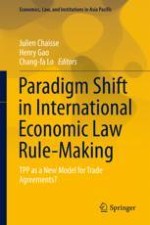2017 | OriginalPaper | Buchkapitel
13. TPP Promoting Financial Services as an Investment Playground: Crystalizing a Change in Approach from GATS?
verfasst von : Antoine P. Martin, Bryan Mercurio
Erschienen in: Paradigm Shift in International Economic Law Rule-Making
Verlag: Springer Singapore
Aktivieren Sie unsere intelligente Suche, um passende Fachinhalte oder Patente zu finden.
Wählen Sie Textabschnitte aus um mit Künstlicher Intelligenz passenden Patente zu finden. powered by
Markieren Sie Textabschnitte, um KI-gestützt weitere passende Inhalte zu finden. powered by
